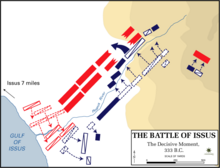| This article needs additional citations for verification. Please help improve this article by adding citations to reliable sources. Unsourced material may be challenged and removed. Find sources: "333 BC" – news · newspapers · books · scholar · JSTOR (February 2024) (Learn how and when to remove this message) |
| Millennium: | 1st millennium BC |
|---|---|
| Centuries: | |
| Decades: | |
| Years: |
| 333 BC by topic |
| Politics |
|---|
| Categories |
| Gregorian calendar | 333 BC CCCXXXIII BC |
| Ab urbe condita | 421 |
| Ancient Egypt era | XXXI dynasty, 11 |
| - Pharaoh | Darius III of Persia, 4 |
| Ancient Greek era | 111th Olympiad, year 4 |
| Assyrian calendar | 4418 |
| Balinese saka calendar | N/A |
| Bengali calendar | −926 – −925 |
| Berber calendar | 618 |
| Buddhist calendar | 212 |
| Burmese calendar | −970 |
| Byzantine calendar | 5176–5177 |
| Chinese calendar | 丁亥年 (Fire Pig) 2365 or 2158 — to — 戊子年 (Earth Rat) 2366 or 2159 |
| Coptic calendar | −616 – −615 |
| Discordian calendar | 834 |
| Ethiopian calendar | −340 – −339 |
| Hebrew calendar | 3428–3429 |
| Hindu calendars | |
| - Vikram Samvat | −276 – −275 |
| - Shaka Samvat | N/A |
| - Kali Yuga | 2768–2769 |
| Holocene calendar | 9668 |
| Iranian calendar | 954 BP – 953 BP |
| Islamic calendar | 983 BH – 982 BH |
| Javanese calendar | N/A |
| Julian calendar | N/A |
| Korean calendar | 2001 |
| Minguo calendar | 2244 before ROC 民前2244年 |
| Nanakshahi calendar | −1800 |
| Thai solar calendar | 210–211 |
| Tibetan calendar | 阴火猪年 (female Fire-Pig) −206 or −587 or −1359 — to — 阳土鼠年 (male Earth-Rat) −205 or −586 or −1358 |

Year 333 BC was a year of the pre-Julian Roman calendar. At the time, it was known as the Year of the Dictatorship of Rufinus (or, less frequently, year 421 Ab urbe condita). The denomination 333 BC for this year has been used since the early medieval period, when the Anno Domini calendar era became the prevalent method in Europe for naming years.
Events
By place
Macedonia
- King Alexander of Macedonia conquers western Asia Minor, subduing the hill tribes of Lycia and Pisidia.
- King Darius III of Persia executes Charidemus, a Greek mercenary leader living in exile in Persia, for criticising preparations taken for the Battle of Issus.
- Alexander has a great victory over the Persians in the Battle of the Issus River in Cilicia, but the Persian Emperor Darius III escapes. Darius leaves behind his wife, his two daughters, his mother Sisygambis.
- Alexander makes one of his officers, Nearchus, satrap of the newly conquered Lycia and Pamphylia in Anatolia and he appoints his general, Antigonus, satrap of Phrygia.
- From Issus, Alexander marches south into Syria and Phoenicia, his object being to isolate the Persian fleet from its bases and so to destroy it as an effective fighting force. The Phoenician cities of Marathus and Aradus do not resist Alexander's armies. Parmenion is sent ahead to try to secure Damascus and its rich booty, including Darius' war chest.
- After taking Byblos and Sidon, Alexander lays siege to Tyre.
- In reply to a letter from Darius offering peace, Alexander demands Darius' unconditional surrender.
Births
Deaths
- Charidemus, Greek mercenary leader
- Memnon of Rhodes, Greek mercenary leader (b. 380 BC)
References
- Walkbank, Frank W. (February 21, 2024). "Alexander the Great". Encyclopædia Britannica. Retrieved February 25, 2024.
- "Darius III". Encyclopædia Britannica. Retrieved February 25, 2024.
- "Charidemus". Encyclopædia Britannica. February 21, 2024. Retrieved February 25, 2024.